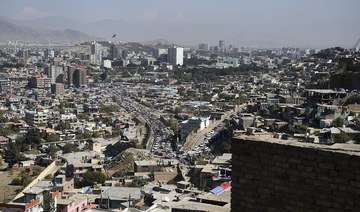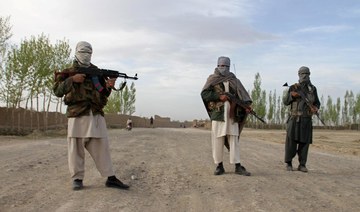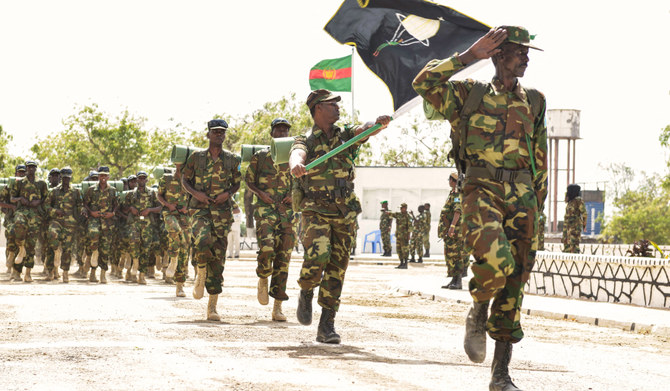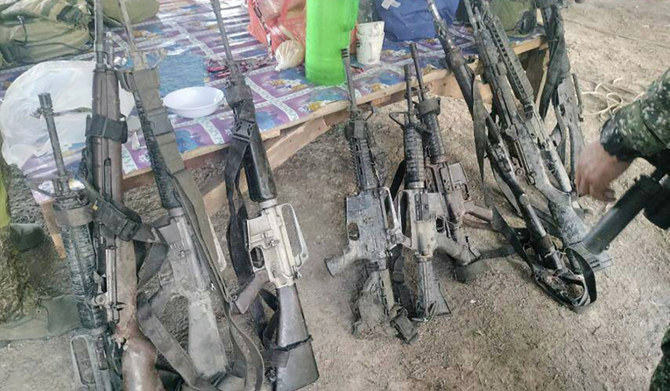KABUL: President Joe Biden plans to withdraw the remaining 2,500 US troops from Afghanistan by Sept. 11, 2021, 20 years to the day after the Al-Qaeda attacks that triggered America’s longest war, US officials said on Tuesday.
The disclosure of the plan came as the Taliban said on Tuesday that the group’s participation in a US-backed summit in Turkey later this week was still “under consideration.”
Dr. Muhammad Naeem, the Taliban’s Qatar-based spokesman, told Arab News: “Our lack of participation is due to the fact that consultations and deliberations are still going on.”
He added that “no agreement has been made” for the April 16 talks and that “the issue (meeting) is still under our consideration.”
On whether or not the Taliban had set any conditions for taking part in the meeting, Naeem said: “We will announce whatever decision is made based on the consultations.”
Turkey, along with the UN and Qatar, is hosting the meeting as part of an American-backed push to jump-start the stalled Afghan peace talks, which began in the Qatari capital Doha between the government and Taliban representatives in September and have been riddled with disputes.
Striking an optimistic note on Tuesday, officials from an Afghan government-appointed team said they expected to ink key agreements at the Istanbul summit, including forming a transitory administration with the Taliban.
Feraidoon Khawzoon, a spokesman for the Afghan High Council for National Reconciliation, on Tuesday told Arab News: “Our expectation is that we will agree on major, important, and fundamental agreements which are cessation of war, restoration of the ceasefire, issues related to the transitory period, and over national and Islamic issues.
“The agenda for the talks will be set by the two sides (government and Taliban delegates).” However, he did not provide the names of government participants at the meeting.
The discussions in Turkey come ahead of a May 1 deadline for the complete withdrawal of US-led foreign troops from Afghanistan based on a deal signed between the Taliban and Washington more than a year ago.
American President Joe Biden said recently that the pullout of troops by May 1 would be a “tough move” without elaborating on how long he intended to retain forces in Afghanistan, throwing the validity of the Qatar deal into doubt.
HIGHLIGHT
Turkey, along with the UN and Qatar, is hosting the meeting as part of an American-backed push to jumpstart the stalled Afghan peace talks.
The Taliban have warned that violence would escalate in Afghanistan if the US failed to abide by the accord, which aimed to end America’s most protracted conflict in its history, which began with the Taliban’s ousting in late 2001.
Some experts believe that the reason for the Taliban buying more time to confirm their participation in the Turkey summit was because their demands had not been met based on the Qatar accord.
Toreq Farhadi, an adviser for the former Afghan government, told Arab News: “(These include a) firm date on US withdrawal (of troops), now that we know May 1 can’t be that date, and deleting names of their leaders from the UN sanctions list.”
He said that the Taliban would “attend in the last days of the conference” and that “it is just a negotiating technique, a postponement, not a cancellation.”
Nazar Mohammad Mutmaen said that the group would not participate in the Turkey meeting “until Biden makes his stance clear on the timetable for the extension of US troops’ presence in the country, the release of remaining Taliban prisoners, and delisting of their leaders from the sanction list.”
He noted that Biden’s refusal to withdraw troops had “created doubts about the US’ intentions in Afghanistan,” adding, “the Turkey meeting won’t happen, and if it does, it will produce no major results.”
In March, Biden’s administration also proposed the formation of an interim government in Afghanistan, which would include Taliban members. This was communicated by US special envoy for Afghanistan, Zalmay Khalilzad, who has been travelling the region to drum up support for a ceasefire and a peace settlement.
US-based Afghan analyst Said Azam blamed “spoilers in Afghanistan and the region who were trying to derail the peace process,” and said the “wisdom and constructivism” of the Afghan people was “the key to success.”
Farhadi added: “Peace spoilers on all sides are already busy sabotaging the post-Turkey arrangements.”
With accusations of corruption rife in the government, insurmountable debt accumulated in foreign aid, ethnic tensions, and talk of NATO and the US “losing interest in Afghanistan,” Farhadi said that the Turkey meeting was “all about passing the Afghan hot potato.”
Tameem Bahiss, a regional expert on Afghanistan and Pakistan, said that Washington’s new administration was after a quick fix.
“It appears Biden is trying to find a quick political solution for the Afghan war. The US is proposing a conference in Turkey, where Washington wishes to see the Afghan warring sides agree on a new political roadmap for Afghanistan.
“Unfortunately, this proposal by the US administration has many problems. A quick fix for the Afghan problems will not last. It is very difficult to get (Afghan President) Ashraf Ghani, the Taliban, and the Afghan political elites on the same page. I see it very difficult for the Taliban to agree to any political settlement prior to the departure of foreign troops.”




























